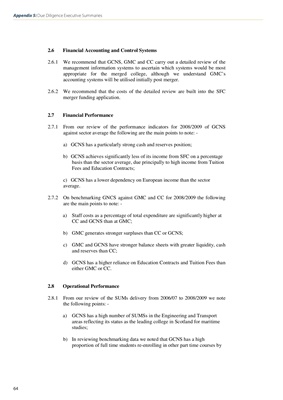
2.6 Financial Accounting and Control Systems
2.6.1 We recommend that GCNS, GMC and CC carry out a detailed review of the
management information systems to ascertain which systems would be most
appropriate for the merged college, although we understand GMC's
accounting systems will be utilised initially post merger.
2.6.2 We recommend that the costs of the detailed review are built into the SFC
merger funding application.
2.7 Financial Performance
2.7.1 From our review of the performance indicators for 2008/2009 of GCNS
against sector average the following are the main points to note: -
a) GCNS has a particularly strong cash and reserves position;
b) GCNS achieves significantly less of its income from SFC on a percentage
basis than the sector average, due principally to high income from Tuition
Fees and Education Contracts;
c) GCNS has a lower dependency on European income than the sector
average.
2.7.2 On benchmarking GNCS against GMC and CC for 2008/2009 the following
are the main points to note: -
a) Staff costs as a percentage of total expenditure are significantly higher at
CC and GCNS than at GMC;
b) GMC generates stronger surpluses than CC or GCNS;
c) GMC and GCNS have stronger balance sheets with greater liquidity, cash
and reserves than CC;
d) GCNS has a higher reliance on Education Contracts and Tuition Fees than
either GMC or CC.
2.8 Operational Performance
2.8.1 From our review of the SUMs delivery from 2006/07 to 2008/2009 we note
the following points: -
a) GCNS has a high number of SUMSs in the Engineering and Transport
areas reflecting its status as the leading college in Scotland for maritime
studies;
b) In reviewing benchmarking data we noted that GCNS has a high
proportion of full time students re-enrolling in other part time courses by
Appendix 5: Due Diligence Executive Summaries
64